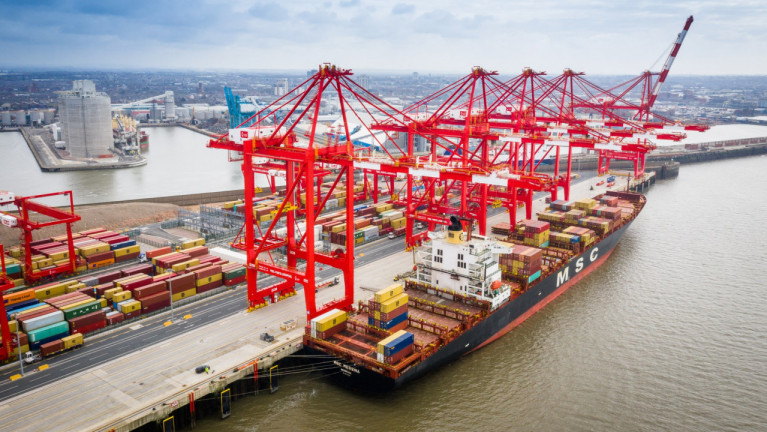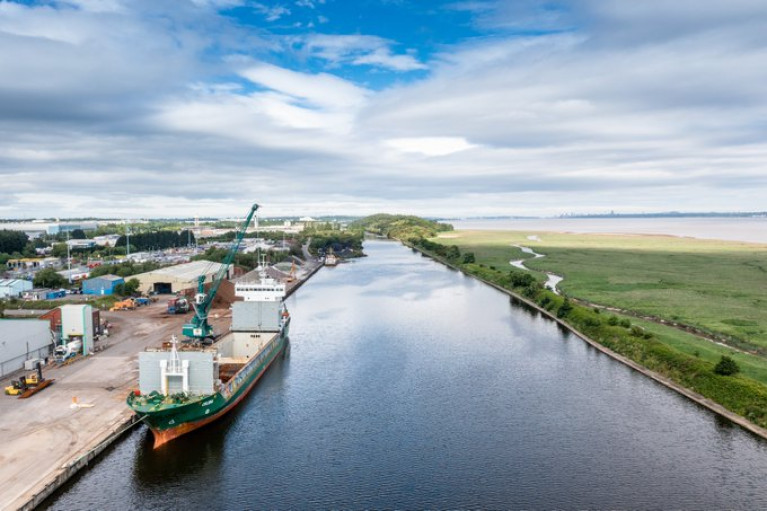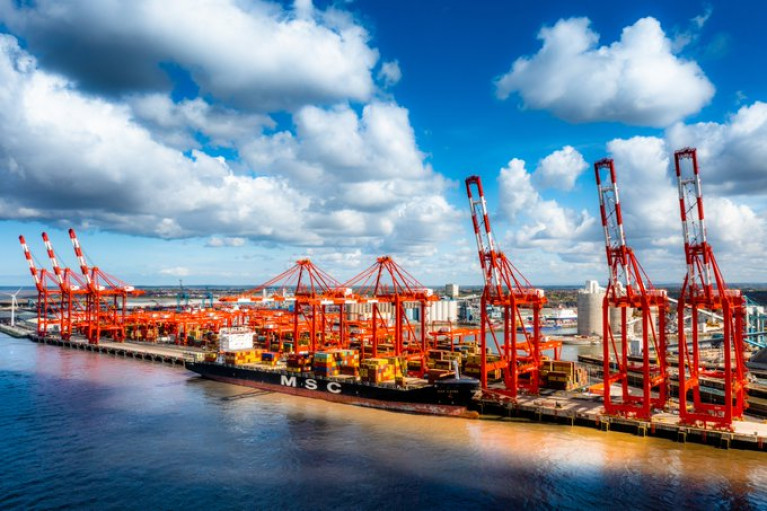Displaying items by tag: Peel Ports Group
CalMac and Peel Ports Group in Row on Safety of Ardrossan Harbour after £15.5m Payment
Scottish government owned Caledonian McBrayne (CalMac) has condemned one of the country’s key port operators which it said has left a major ferry port harbour in an "unacceptable" condition. The situation was putting safe operations at risk despite CalMac paying out nearly £15.5m in fees over the last decade.
CalMac, the UK’s largest domestic ferry operator, has made a rare broadside over the conditions it has to operate in Ardrossan Harbour. The ferry company having delivered a damning indictment on the state of the port in North Ayrshire. The 55 minute service provides a crucial lifeline to and from the Isle of Arran and in a response to a campaign to nationalise Clydeport to bring the ports and harbours on the River Clyde into public ownership.
The ferry company’s interim chief executive, Duncan Mackison, has criticised the state of Ardrossan Harbour which is owned by Peel Ports Group, the UK’s second largest port company. Commenting on the facilities he said: "have not been maintained to an acceptable standard" and he added that there has been a lack of investment.”
In addition, he said in a message seen by The Herald, that the condition of Ardrossan Harbour "is all the more unacceptable" because of the £15.48m that CalMac has paid to Peel Ports for the use of its berths among them the ‘Irish’ berth as Afloat previously reported.
More here on the dispute between the ferry operator and port group.
Port of Liverpool Extends Steel Terminal as Peel Ports Group Deal with Growth in Demand
At the Port of Liverpool, part of the Peel Ports Group, is to extend its steel and metals terminal in response to strong growth in customer demand at the north-west England port.
The UK’s second largest port operator began construction of the 20,000 square foot extended warehouse at its North 3 Canada Dock earlier this year
The group’s investment comes as the Port of Liverpool enjoyed one of its busiest months for steel volumes in September, with more than 75,000 tonnes handled by staff across the port and Birkenhead Docks.
It is the port’s busiest month for steel in more than two years, when 93,000 tonnes were handled at the site in July 2021.
An initial 8,000 square foot of the newly created warehouse space is already in use, with a second phase of construction work to build an extra 12,000 square foot of the terminal ongoing and will be completed in December.
Phil Hall, Mersey Ports Director at Peel Ports Group said: “We’re really pleased to have seen such an increase in demand for steel handling at our port in recent months.
“This positive news led to us choosing to increase the size of our facility, which offers customers the chance to expand their capacity, as well as improving our handling facilities at the port.
“Given the benefits of the Port of Liverpool’s central location, and its proximity to UK manufacturing sites, we believe this will be a very important and worthwhile investment.”
The site now has 280,000 square foot of internal storage, as well as 100,000 square foot of external footage. It also has a total throughput capacity of in excess of 600,000 tonnes annually.
The facility was once the UK’s first fully-automated steel terminal following a £9m upgrade in 2016.
Real time stock availability, precision coil selection and a vehicle booking system has minimised back office processing and paperwork, handling, as well as haulier turn-around time since its completion.
UK's Second Largest Port Operator Reduces Greenhouse Gas Emissions by Almost One Third in Three Years
Peel Ports Group, the UK's second largest port operator, has announced today that it has significantly reduced its greenhouse gas emissions across its port facilities, by cutting these by almost a third since 2020.
The reduction is revealed in the group’s new 51-page ESG report (download)- one of the most detailed reports of its kind to be produced by any UK port operator of similar size.
As the country’s second largest port operator, Peel Ports has published the document to showcase their commitments to sustainable port operations.
The independently verified figures confirm the group has reduced Scope 1 & Scope 2 emissions across its port operations by a total of 32 per cent, against its 2020 baseline and using a market-based accounting approach.
The company’s Scope 1 emissions across its port operations have fallen by 47 per cent alone during that time, largely helped by transitioning to using biofuels instead of diesels in straddle-carriers and other equipment, and through the electrification of 97 per cent of the group’s vehicle fleet.
Claudio Veritiero, Chief Executive Officer at Peel Ports Group, said: “As one of the UK’s largest port operators, and a major employer in the areas in which we operate, we are fully aware of the role we need to play in driving the sustainability agenda.
“We took the lead within our industry when we announced our commitment to become a net-zero business by 2040, and this level of ambition has been replicated across our other focus areas of sustainability, including our approach to equality, diversity and inclusion as well as social issues.
“I am particularly proud of the significant projects and initiatives we’ve introduced to reduce our carbon footprint over the last twelve months, and whilst we have some way to go, this sets us in good stead for the year ahead.
“This report represents a steppingstone in our journey to delivering sustainable growth for the business and we remain fully committed to building on the achievements we’ve made to date while working to further embed sustainability as a driver for our future success.”
The annual report will enable Peel Ports Group to effectively monitor and deliver on its ESG ambitions as it seeks to become the number one sustainable port organisation in the UK.
The report details investments and initiatives to help the company reach the net zero milestone by 2040 across all of its locations in the UK and Ireland, nearly two years after the company first declared its ambitious net-zero plans.
It further delves into how Peel Ports Group’s ESG strategy is underpinned by several UN Sustainable Development goals to help it make a meaningful impact globally.
The strategy aligns with four UN priority goals: Decent Work and Economic Growth, Industry, Innovation and Infrastructure, Climate Action and Life Below Water.
Future ESG and Sustainability reports will continue to effectively measure progress to help ensure success.
Mersey Maritime, a regional cluster organisation for the maritime industry in the Liverpool City Region and greater North West England, will be part of the forthcoming London International Shipping Week (LISW) of 11-15 September.
This year, Mersey Maritime is hosting ‘Mersey on the Thames‘, an exclusive drinks and networking session hosted by Shadow Maritime Minister, Mike Kane MP of the Terrace of the House of Commons.
Alongside our host Mike Kane MP, Shadow Transport Minister, guests will hear from Ruth Wood, Interim CEO of Mersey Maritime and Stephen Carr, Group Commercial Director of Peel Ports Group.
Guests will hear about opportunities within the Liverpool City Region and wider North West and ambitions for the region to become the test bed for emerging technologies, decarbonisation and interconnectivity of freight journeys.
As Afloat previously reported, General Lighthouse Authority, Trinity House will also be attending LISW, which is one of the most important international shipping and maritime events in the world. Since its conception in September 2013, LISW has grown consistantly and is set to become an even bigger event in 2023, when the shipping world is able to meet again in person and in earnest.
The Mersey on the Thames event which is invitation only, takes place at the terrace overlooking the Thames.
Operator P&O Ferries to Close Dublin-Liverpool Route
P&O Ferries, a subsidiary of DP World owned by the UAE government based in Dubai, has announced plans to close the Dublin-Liverpool route towards the end of the year, reports RTE News.
The Irish Sea route connecting the Irish capital to Merseyside in north-west England will be axed due to the unavailability of a berth in the city for next year, the company said.
"Without agreement with the port owner to provide a berth in Liverpool, it is impossible for P&O Ferries to continue operating on this route" it said in a statement.
(Afloat adds the port on Merseyside is operated by the Peel Port Group, the UK's second largest ports operator).
"Extensive negotiations with the owner of our Liverpool site to extend our lease at the port or find an alternative site for our Liverpool-Dublin service to operate from have been unsuccessful.
"P&O Ferries is committed to serving our Irish Sea customers and has explored all options to continue sailing on this route".
"Unfortunately, despite the utmost efforts by P&O Ferries to find a viable solution, no suitable alternative has been offered that would enable us to maintain the current service into 2024.
"We are saddened by our forced withdrawal from this route, which will reduce competition and the choice of sailings available to customers on a crossing where there is currently only one alternative operator."
The route which is P&O's only service between the Republic of Ireland and the UK is served by twin ropax ferries, Norbank (as seen above in Dublin Port) and Norbay.
Together, the 17,464 gross tonnage ropax ferries make 24 sailings a week on the 8 hour route that is mainly used to transport freight with each vessel carrying 125 trailer units.
In addition the ropax vessels carry motorist-only based passengers with up to a 114 capacity that includes provision for 12 accompanied freight truck drivers.
The Dover headquartered, P&O intends to redeploy the ropax twins on other routes of the company's network which includes freight only routes on the North Sea (see story) between the UK and mainland Europe. Afloat adds in addition, P&O operate passenger/freight routes on the North Channel route of Larne-Cairnryan (see 50th anniversary), Dover-Calais and Hull-Rotterdam.
"We are now beginning a consultation process with our employees affected by the intended closure of this service," it said.
"We will offer support to affected colleagues to find alternative employment within our business, or where that is not possible, help to find employment elsewhere.
"We have also worked to ensure that where possible our customers affected by the intended closure of the Liverpool-Dublin route can access alternative services with other operators.
"We remain fully committed to serving customers on our Irish Sea crossing between our ports in Larne and Cairnryan, where we recently celebrated our 50th year of operations, and on our network around the UK."
RTE News which has much more here on the development including the response of politicians and hauliers as the President of the Irish Road Haulage Association said he is "saddened" by the announcement about the end of the Ireland-UK route.
For further coverage of the closure from a UK perspective, the Liverpool Echo reports on the historic Irish Sea route which in March 2022 formed part of the controversial mass sacking by P&O of almost 800 seafarers and staff.
In January this year, Afloat reported the switch of terminals within Dublin Port between P&O Ferries and rivals Seatruck, which was acquired in November 2022 by the giant ro-ro operator, CLdN, based in landlocked Luxembourg.
Irish Salt Mining Company and Peel Ports Group Joint Investment Sees Completion of Road De-Icing Salt Storage Facility
The Irish Salt Mining Company which is a longstanding customer of Clydeport owner, Peel Ports Group, have in a joint multi-million pound investment completed construction of a de-icing salt storage facility at the Scottish port's King George V Dock.
The 500m2 storage facility will hold a minimum of 40,000 tonnes of road salt and support the maintenance of Scotland’s road networks over coming winters.
The Peel Port Group have entered a long-term deal with the Irish Salt Mining Company which has its privately owned mine in Carrickfergus and Afloat adds, its nearby Kilroot Jetty is where vessels up to 175m in length can berth at facility on the northern shore of Belfast Lough. An average loading rate of around 1,000 tonnes per hour is achieved at the jetty which has a minimum 9m draft.
The shipment of the de-icing road salt to Scotland will be for years to come and the new facility will allow it to be stored in higher volumes than ever before. The first bulk shipments of salt to the new facility have already been completed, and delivery to its customers took place in July.
Jim McSporran, port director at Peel Ports Clydeport, said: “We’re pleased to have completed construction of our new salt storage facility, which can handle increased volumes of road salt, and will help add essential resilience to the road salt market in Scotland.
"We’ve already received our first shipment of salt to the new shed, and our teams are beginning work to ensure we are ready to support road maintenance across West and Central Scotland this winter.
“We look forward to continuing our strong working relationship with the Irish Salt Mining Company on this project, which serves a vital need in Scotland.”
Also known as Salt Sales Co., Irish Salt Mining Company is a key supplier of de-icing rock salt to local authorities across West and Central Scotland, as well as highway maintenance contractors.
The salt mined from Carrickfergus will be loaded on ships from Kilroot and sail directly into the Peel Port Clydeport facility at King George V Docks.
Peel Ports Clydeport staff will unload the salt from the ships arriving at the port and either load out lorries for delivery to customers or add the salt to the stockpile shed.
Thanks to the specialist facilities on site, shipments of 7,000 tonnes can be discharged in approximately 12 hours.
In total, Irish Salt Mining produces around 500,000 tonnes of de-icing rock salt per annum from the mine in Carrickfergus.
UK Ports Deal Agreed to Acquire Stake in Peel Ports Group
According to InsiderMedia, APG, Global Infrastructure Partners and AustralianSuper have agreed to acquire a 37.4% holding in Peel Ports Group from DWS.
Peel Ports (the UK's second largest ports group) is behind the likes of Liverpool2 and Manchester Ship Canal.
The transaction is expected to close in the first quarter of 2022, pending regulatory review and approvals.
Peel Ports is a critical UK infrastructure asset and responsible for the operations and management of a network of seven strategically located ports around the UK and Ireland (where Afloat adds in Dublin Port is their MTL Terminal serviced also by the group's subsidairy BG Freight Line).
Mark Whitworth, chief executive of Peel Ports Group, said: "The ambitious partnership between shareholders and management has been a cornerstone of the company's success and we look forward to building on those achievements with our new like-minded Shareholders APG & GIP, alongside The Peel Group and AustralianSuper."
More on the story here.
UK's Second Largest Ports Group Calls for Supply-Chain Rethink Across Country's Port Network
In the UK, the second-largest port operator is calling for the supply chain to rethink its approach by making better use of the entire port network across the country.
Peel Ports says that it is essential for logistics firms and cargo owners to take advantage of the full range of private, public and trust ports all along the UK’s coastline, helping to address problems caused by trade bottlenecks in the South-East.
According to Maritime UK, the UK ports industry handles 95% of UK import and export by volume. Despite the large number of ports in the UK, much of the freight traffic is concentrated among a comparatively small percentage, with the top 20 ports accounting for 88% of the total.
Local logistics could sort supply chain woes
- UK’s network of 120 commercial ports is under-utilised
- Bottlenecks in a small number of major ports are harming UK plc
- Commerce as a whole will gain from spreading the load
David Huck, Managing Director of Group Ports at Peel Ports, said: “It might raise eyebrows that we’re encouraging companies to use competitors as well as ourselves, but these are exceptional times. Brexit, Covid and the long-standing HGV driver shortage are all combining to challenge the supply chain like never before.
“Congestion in southern ports has long been an issue and there has traditionally been a huge reliance on the south to facilitate the UK’s supply chain. Currently 95% of goods enter the country via the south, yet 60% is actually destined for the north. We have long argued the UK is too reliant on the South-East and the current climate calls for a serious rethink on the future of alternative regional ports being used as points of entry and exit.”
“The UK has excellent coverage throughout the country of ports for every size vessel and every commodity. We need to take full advantage of this by moving goods by sea as much as possible and doing so closest to their point of origin or their destination. That will reduce the pressure in congested areas and allow us to better use both the supply of haulage services and the road network. That is in everyone’s interests.”
Peel Ports has invested around £1.2 billion worth of infrastructure into its ports across UK and Ireland (MTL Terminal, Dublin Port with caller BG Freight Line), to prepare for increased demand and pressures on the supply chain. Investments include the L2 container terminal in Liverpool, Brexit contingencies for HGV trailers, new rail connections to major UK city hubs and a heavy recruitment campaign to increase labour.
This investment has helped to attract more services to Peel Ports’ facilities. Following a successful trial earlier this year, DKT Allseas announced that its China Xpress liner service will become a permanent route into Liverpool, complimented with the introduction of a new onward rail service into Freightliners Birmingham terminal.
Ports Group in UK Nominated as Port Operator of the Year
Peel Ports Group, the UK's second largest port operator has made the shortlist for Port Operator of the Year at the prestigious 2021 Multimodal Awards for the logistics industry.
The port group manages several key regional trading hubs for the UK economy, including major facilities in Liverpool, London Medway and Glasgow.
Afloat adds Peel Ports also operate Marine Terminals Ltd (MTL) in Dublin Port, where part of the group runs BG Freight Line with container connections linking the UK, The Netherlands, France, Portugal and Spain and onward worldwide. The Irish terminal also provides supply chains for CMA/CGM (see story) DFDS, MacAndrews and Seago Maersk.
The nomination for the award comes on the back of a decade of strong financial performance and investment, which has seen EBITDA double over the last 10 years, by £131m (FY11) to £275m (FY21), and £750m+ invested on infrastructure over the past five years, contributing to significant employment, regeneration regional growth.
Mark Whitworth, CEO at Peel Ports said:Our company has transformed since 2011 and we believe the long-term approach we have taken with the business is a significant factor in being recognised as one of the UK’s top operators. The investment we have made into our ports and our wider logistics business continues to improve services for customers, create jobs and support the wider economy.
Despite the challenges of Brexit and the pandemic, our team has risen to every challenge and continued to provide first class services to the supply chain. That gives us a lot of confidence that we are on the right track and I’m certain that even more successful times are ahead of us.
The 2021 Multimodal Awards recognises excellence in air, road, rail, maritime, and freight forwarding services, with categories voted for by readers of the Multimodal newsletter and exhibitors & visitors to Multimodal.
The awards ceremony will be held at the NEC in Birmingham on Tuesday 19th October 2021, with more than 650 guests from across the sector expected to attend.
UK Ports Group Expands Logistics Service With Acquisition At Port Close to River Mersey
A UK ports operator, Peel Ports Group which includes the Port of Liverpool, has announced it has acquired Quality Freight (UK) Limited for an undisclosed amount.
The company acquired provides chartering and a range of port services operating from a 40 acre multi modal facility at Ellesmere Port in Cheshire. The port located on the Manchester Ship Canal connects to the River Mersey.
Commenting on the acquisition, Mark Whitworth, Chief Executive of Peel Ports Group said: “Our strategy is to be a leading UK provider of port centric logistics solutions. The acquisition of Quality Freight (UK) Limited is an important step in extending the range of value added services beyond the core stevedoring and storage services typically offered by Peel Ports. We are looking to drive additional volume through our infrastructure and the Quality Freight business model will allow us to deliver that objective.”
Sebastian Gardiner, who will be continuing in the role of Managing Director of the business which will continue to trade under the Quality Freight name, commented: “I believe that this is an important milestone which will allow the Quality Freight business to both continue growing and allow it to explore other opportunities with existing and new customers.”
































































